#Hetalia racism
Text
I think it's so funny how people in this fandom would rather racebend white nations into being non white instead of going ahead and giving rep to the PLETHORA of actual non white countries like y'all see how fucking stupid and racist you look right ?
You're more comfortable with white nations (who are often imperial) being portrayed as non white rather than real non white countries and will reblog like. Racebent Romano art but someone posts something of India or Iran and suddenly there's crickets lol you guys racialise the fuck out of non white country art in this fandom but will reblog racebent white nation art and we all know why.
It's because you cannot stomach authentic non white cultures so you have to completely divorce us from our histories, practices and languages in order for us to be palatable and blorbo enough for you. We have to be sanitised from everything that makes us "weird" and "different" before you guys will even give us a chance and then you end up with a supposed anthropomorphised nation oc who represents nothing but your inability to pay more than 5 minutes of attention on a country that is not white and call it a day.
#hetalia#Hetalia critical#Hetalia racism#hetalia world stars#hetalia world series#hetalia world twinkle#Hetalia fandom#Hetalia discourse
105 notes
·
View notes
Text
ro/chu fans on tiktok are really something for speaking over chinese people and claiming they’re the ones with internalized sinophobia. the white savior complex is insane
#disc horse#hetalia racism#white fans do not know how to stay out the business of things they have no idea what they’re talking abt#i’m seriously shocked how you can have multiple mostly chinese people telling you you’re fucked up#and you continue to not listen
25 notes
·
View notes
Note
y r Hetalia fans on yr blocklist? :’(
I. I’m sorry. are you deadass asking me why I don’t want the nazi anime fans following me. sorry for not wanting to interact with the racism: the anime fanbase I guess

2 notes
·
View notes
Text
RACEBENDING NATIONAL PERSONIFICATIONS: A TREATISE
DISCLAIMERS:
I AM NOT WHITE, I AM A POC. I am not writing this because I’m a butthurt white person who gets pissy when someone makes my white faves nonwhite and thus unrelatable to me for ‘some’ reason.
I AM NOT PERSONALLY ATTACKING ANY INDIVIDUALS WHO RACEBEND OR IMAGINE THEIR NATIONS TO HAVE A DIFFERENT ETHNICITY THAN WHAT THEY DO IN CANON; ON A SIMILAR NOTE, DO NOT ATTACK SUCH INDIVIDUALS FOR ME. This is a discussion of general fandom trends and a larger phenomenon, the issue I am talking about cannot be solved on an individual to individual basis.
I AM NOT TRYING TO STOP FIRST NATIONS PEOPLE FROM RECLAIMING THEIR NATIONS. As I am not First Nations myself, I would not wish to deny what these individuals emotionally and mentally reap from reclaiming their nations.
I AM NOT THE “POC AREN’T ALLOWED TO HAVE FUN AND SEE THEMSELVES IN THEIR FAVES” POLICE; I AM NOT YOUR MOM, DO WHATEVER YOU WANT. Again, this is a discussion of fandom trends and a larger phenomenon. I think it’s almost always worth examining why we do the things we do and the reasons behind a trend.
I AM NOT AGAINST RACEBENDING IN GENERAL. This is specifically an essay on racebending in nationverse Hetalia and other personified nations fandoms.
PREFACE
As stated before in my disclaimers, this essay is not intended to be a condemnation of individuals who participate in racebending. Rather, I intend to make a macro-critique of wider structures and patterns. For this reason, this essay is not accusing anyone engaging in racebending of holding any specific belief. I cannot stress enough how much I do not know you, the hypothetical reader who engages in racebending.
Again, my intent is to critique wider structures and patterns.
This essay is a conversation I would like to have with other POC and other marginalized groups, especially POC based in white, Western countries. Thus, I ask people not included in the above groups to refrain from weighing in on this.
ALTERNATIVE GOOGLE DOC LINK HERE
TABLE OF CONTENTS
The Difference in Reception for Racebent versus Non-Racebent Characters
The Inherent Politicism of Personifying Nations
The State of POC Representation in Hetalia
The Assumption of Interchangeability in POC Experience
The Myth of Multiculturalism
“It’s Just Fandom, Why Are You Trying to Control POC Who Just Want to Have Fun and Want to Represent Themselves?"
Conclusion
The Difference in Reception for Racebent versus Non-Racebent Characters
I will start this essay off with an acknowledgement of my station in the Hetalia fandom and how it uniquely equips me to talk about this topic – I am very fortunate to enjoy a follower base that primarily follows me for non-Western characters, whether they be canonical or my own original characters. As someone who mostly posts non-Western characters, I can confirm that there is a wider disparity in reception between drawings of my white characters and non-white characters. The following example is not from myself, but from the artist miyuecakes who similarly focuses on predominantly non-white, non-Western countries. You can see there is a drastic gap in the amount of notes that post focused on five nations considered to be non-Western versus a drawing of Female America.
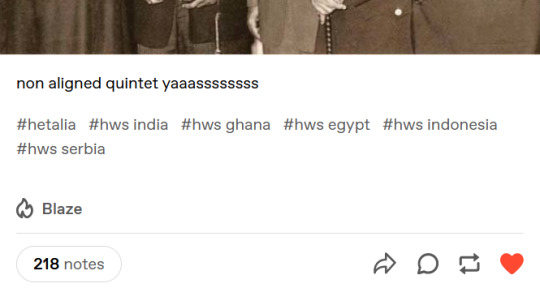
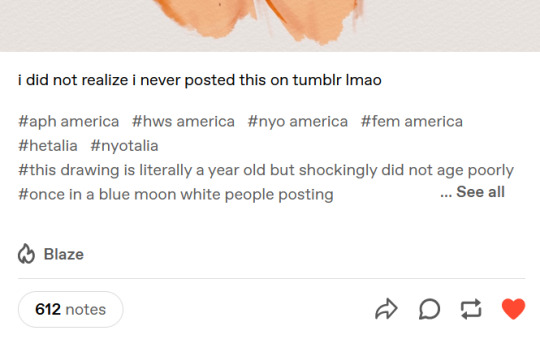
Stating this fact of the fandom is fairly noncontroversial. I would also assert that the following statement is equally true, however given recent reception, is far more controversial: “There are far more instances of racebent canonically white/Western characters, which receive far more traction than their non-racebent counterparts, whether canonical or not.”
I want to make clear what my statement is not saying:
Racebending is only done by white people seeking to score clout and diversity points without having to care about canon non-white characters. In fact, the vast majority of racebending in the fandom is done by POC looking for representation; given the amount of white canon nations compared to any other nation, POC who engage in racebending see it as a way of “evening” the disproportionate overrepresentation of white countries.
POC who engage in racebending are doing so to score clout and diversity points with a white audience. Refer to my above point.
Racebent canonically white characters are met with no controversy or racist/bigoted vitriol. It is fairly well known that there have been multiple harassment campaigns, particularly on Twitter, against artists and editors who’ve engaged in racebending even outside of the Hetalia fandom: see the Black Anya edit, Thumin’s artwork and resulting hate. POC being visibly POC in online spaces will always garner backlash.
On a similar note, I am not including POC cosplayers cosplaying white or light-skinned characters in my definition of racebending. Being angered by POC who cosplay characters of a different complexion is blatantly racist; anyone who is angered by this has nothing of value to add and not worth arguing with.
I am a bitter artist who is mad that I don’t receive enough notes on my posts with non-racebent characters compared to posts about racebent white characters. As stated earlier, I am grateful for the audience I’ve cultivated who specifically follow me for non-racebent non-Western content; I am also more than aware that my content is not what people who seek out racebent content are looking for, and have no interest in changing either my content or their tastes. The last thing I would wish to do is to label POC creators who engage in racebending as “the enemy” and POC creators who don’t as “my side.”
With that out of the way, I bring up this observation because I think it’s worth asking ourselves, POC specifically, the following questions: Why? Why is there this discrepancy in frequency and reception between these kinds of characters and content? Why do people racebend in lieu of focusing on existing POC and creating their own non-white characters?
The easy answer most would give is because white characters are over-represented and given more screen time and attention in the canon, so people, especially POC, will become attached to them and create variations of them that hit closer to home for them; this is especially the case if you are a POC who has had experiences living as a minority in a Western country. Some POC may also use racebending as a way to subvert national myths that have historically excluded people of color for a variety of racist, imperialist reasons. I know I used to subscribe towards a depiction of non-white passing America and Canada for this very reason.
In the rest of this essay I would like to examine and critique the practice of racebending national anthropomorphisms traditionally and typically depicted as white in the context of Hetalia and by extension other media involving similar premises. This essay argues that while racebending may be harmless for most other anime, Hetalia – by virtue of its content centering real life nations – carries political implications that are not necessarily appropriate.
I stress again that I can’t stop you or what anybody in the Hetalia fandom does. I do not have that kind of power nor the will to do such a thing. All I ask is for you to listen to the following with an open mind, and if there’s only one thing you take away from this, I hope it’s to realize that POC in particular have valid reasons to dislike racebent depictions of white nations; holding such a stance does not make them anti-POC representation and somehow no longer POC and instead, a member of the white oppressor class.
The Inherent Politicism of Personifying Nations
Firstly, I repeat that a series about personified nations is deeply political and every creative choice carries political and socio-cultural ramifications, whether intentional or not and made by the creator or the fan. Even if you mostly interact with Hetalia in a depoliticized context, others may not, and given that nationverse Hetalia is about personified nations, this is perfectly reasonable.
Let us look into the canon material of Hetalia- It is shown that nations on average have close ties to their governments, viewing them as their bosses and carrying out actions for them. We are shown that there are nations who go against the orders of their governments, such as Germany; this does not mean all nations follow in that pattern, however, and there are many who are in lockstep with their governments and their actions.
Therefore, for individuals whose ethnic groups and nations have suffered great harm from oppressor nation-states (Philippines v. United States, Indonesia v. Netherlands, India v. England), it is not irrational for them to be unsettled by their oppressor being racebent- especially when said oppressor nation-state is depicted as being the same ethnicity as the very group(s) they marginalized. This is uncomfortable for multiple reasons:
There is an implication that a member of a marginalized group possibly chose to take part in atrocities and misdeeds that the said marginalized group historically not the major perpetrator behind. In more egregious cases, a member of a marginalized group willingly chose to commit atrocities and misdeeds on a large scale against their own group.
The oppressor state personification was forced by their government to commit these grievous acts of harm against members of other marginalized groups/their own marginalized groups; thus, the personification of the nation-state, the people, has little to no culpability as an oppressor, and is instead made into a fellow victim of their own government.
This deflects blame from the embodiment of the state of being an oppressor. The suggestion here is that the state is somehow completely separate yet intertwined with the government – it was simply the government who perpetrated the crimes… the people were just unwillingly complicit. This can come across as an erasure/rosewashing of the very purposeful policies used to harm and disadvantage colonized/oppressed groups.
This can also erase the fact that in many cases, the people gave the government’s actions their tacit approval whether it was through whole-hearted enthusiasm or apathy towards the suffering of others.
In the case that the racebent nation’s minority ethnicity was historically involved in such acts, this involves highly sensitive conversations about minorities’ complicity in crimes and assimilation into the white/majority order (e.g. Chinese and East Asian settlers in Hawaii after America’s illegal annexation, Korean collaborators with the Japanese annexation of Korea, African American soldiers in the Philippines); these are extremely touchy subjects that should be had within the relevant ethnic groups, and should not be appropriated by outsiders, particularly white people, especially for fandom purposes.
(I will discuss insiders racebending nation-states to their ethnic group that have suffered mistreatment and oppressed by said nation-states in “The Myth of Multiculturalism.”)
Additionally, racebending may end up justifying those very same crimes, especially in the case of settler colonialism. For example, during French rule of Algeria, the French government began a program of confiscating Algerian land from indigenous Algerians and giving them to French and European settlers. Over the course of two centuries, more and more land was taken away from indigenous Algerians, forcing them to move to the margins of society, where they were barred from accessing employment, higher education, and the other societal amenities.
Many would be able to identify how personifying Algeria as a white, French individual would be erasing indigenous Algerians and implying that the French settlers represent all of Algeria. However, conversely, making France an Algerian man is also playing into colonial French propaganda. The French viewed Algeria as part of France and the French homeland itself, unique even among other French African colonies, and made plans to make Algeria a full-fledged French province, or department. To make the national personification of France Algerian then, is to suggest that this belief was and is correct, that the Algerians are a part of the colonial core of France, even if the intention is to represent the modern day Algerian diaspora in France.
IMPORTANT: I will expand on the politics of representing diaspora populations in the section “The Myth of Multiculturalism.”
Given all of these reasons for why POC may justifiably react negatively to a racebent white nation personification, some may argue against these with:
“Why is it that when the nation is white, they never have to deal with any of these heavy discussions of imperialism, bigotry, oppression, etc, but when they’re racebent they suddenly have to? Why are they suddenly politicized when they’re racebent?”
My response to that is that they were politicized, even when they were white because the act of personifying a nation is inherently political; to ignore a white nation’s history of oppression is a politically charged move in of itself. Are we really depoliticizing POC when we racebend a white nation and try to maintain that same ‘depoliticization’ and omission of historical oppression but this time for a POC face? To racebend a white nation is to refuse to contend with the contradiction of transforming an oppressor class to the very group they marginalize - making racebending an inherently political act. It is not necessarily that whiteness is unpolitical but rather that an active refusal to deal with this contradiction makes the political implications much more obvious.
Additionally, this rebuttal raises another question- Were we to completely forget about a character’s background as the personification of an oppressor state and the political weight of that, would that truly solve the problem of POC being politicized? I don’t think so- In the current world we live in, POC are always political. But exclusively racebending oppressor states makes no attempt to depoliticize non-Western POC states, creating a divide between POC that get to be “depoliticized” and POC who don’t based on their proximity to the West.
The State of POC Representation in Hetalia
Some would argue with the points of my last paragraph saying that I am not including POC who both engage in racebending but also create non-Western POC OCs; if equal attention is given to both, there would be no division between racebent Western POC who get to be humanized and non-Western POC who don’t, right?
To answer this we must acknowledge wider trends in racebending in Hetalia. Consider the following: When somebody has a North African! Romano, how many other North African nations (canon or non-canon) do they show appreciation for? Create content for? Expound the same amount of mental and creative energy for? Furthermore: If they do have another North African nation(s) they create content for, are they allowed to exist as their own separate beings, and not purely exist to be North African! Romano’s tie to North Africa?
Chances are, Romano is reduced to being the token brown character in a largely white cast and isn’t allowed to ever exist without whiteness surrounding him. This is a very diaspora experience, but I find it unfortunate that in a piece of media that enables us to explore any number of cultures and experiences over all of time and history, we (and I’m including myself as another POC who grew up in a primarily white environment) are unable to imagine ourselves outside of this setting and celebrate ourselves without having to exist against a white mainstream. Stories about white engulfment are allowed to exist and should be told, but why is this so common? Why do these stories disproportionately outnumber POC stories where whiteness is minute or absent?
As my audience is intended to be mostly POC, I will not elaborate on the following scenario too much, but I will ask us to scrutinize the ethics of it. What about cases where white individuals racebend some of their white favorite characters and position them as POC representation in lieu of actually focusing on POC, non-Western nations, canon or not? Does this not have implications about what kinds of POC and diversity are considered more palatable and appealing?
Furthermore, when another North African nation does exist alongside racebent Romano, their character and depiction is almost always heavily dependent on their relationship to Romano, a Western nation. This still perpetuates the same inequality I was talking about earlier where POC nations are humanized based on their proximity to the West, whether because they personify a Western nation or happen to have a relationship with a Western nation.
We should not just be talking about having “more” non-white representation, but also the quality of it. It is completely understandable why some POC may not be satisfied with the representation most racebent content provides, even beyond the reasons outlined previously; this type of representation excludes POC who do not have a relationship to the West, and is still largely focused on the West.
IMPORTANT: I am not saying that contact with or influence from the West makes POC somehow “less POC” or that stories from Western-based diaspora are a “diluted” form of representation. I will expand on this in the section “The Myth of Multiculturalism.”
“Well if it’s not good enough for those POC, then they should just mind their business and make their own representation! There’s plenty of non-racebent content out there!”
Many POC do exactly that- creating their own representation without racebending. However, as established earlier, racebent white characters receive far more attention and feedback compared to canonical non-white characters, despite the fact that both depictions fulfill the purpose of “representation.” This can be especially disheartening in a fandom that already heavily tokenizes canon POC nations, whether it’s India being presented as the “nanny”/surrogate parent in Commonwealth group art or Seychelles as the “adopted child of color” in FACES family. To POC content creators, it feels insulting that the wider fandom, rather than developing POC canon characters (or taking advantage of the source material’s potential by making OCs) and viewing them as representation, the fandom chooses to racebend Western nations and celebrates them instead.
I want to make clear again what I am not saying with that statement:
POC who engage in racebending are doing so to score clout and diversity points with a white audience. Again, it’s a fact that the vast majority of racebending is done by POC looking to create their own representation.
POC who engage in racebending should all go stan Seychelles and Cuba instead. This is an extremely individualist solution to what is a wider phenomenon. I do not blame POC based in Western countries for feeling disconnected to the few POC nations we have in canon.
Racebent POC content is more popular than content of non-racebent white characters.
What I am describing here is how an audience (the Hetalia fandom) receives two creations, both made by POC in the pursuit of creating more representation, and the difference in reception. The difference, it seems, is that the wider fandom deems certain kinds of POC representation more appealing, and thus, certain kinds of POC worth focusing on.
The Assumption of Interchangeability in POC Experience
Earlier, I mentioned that one of the possible reasons for POC to engage in racebending is the desire to see an iteration of their favorite character that is closer to their own reality and lived experience. Therefore, some may choose to racebend a white character to embody a marginalized minority in the country instead so they can share more experiences with the formerly white characters.
Here, I will not be dealing with the practice of POC racebending their own country to their own ethnicity, which is the focus of the next section. Instead, I will be delving into the practice of POC racebending another nation to embody a minority (one which they do not belong to) for the purposes of ‘putting themselves in their interpretations.’ I argue that to do this requires assuming a certain level of interchangeability between POC experiences.
First and foremost, POC are not a monolith- we lead drastically different lives depending on our ethnic backgrounds, where we live, our socioeconomic class, our political and racial context, and etc. Therefore, we cannot presume that our experiences of marginalization mean we’ll always succeed in properly representing other minority groups elsewhere; in fact, the goal of projecting our own life experiences onto them means that there will be an obstacle to properly representing these minority groups.
Take the following example: Imagine a Chinese-Malaysian individual greatly enjoys the character of Spain. Wishing to better relate to him, the individual racebends him to be also Chinese. However, a great deal of historical, cultural determinants and nuances separate the experiences of Chinese people in Spain and Chinese people in Malaysia. There are similarities, yes, but this Chinese Malaysian cannot hope to properly represent the Chinese population in Spain if their primary goal remains self-projection. Now imagine that our Chinese-Malaysian individual wished to racebend England to be Indian; an even wider gap separates the experiences and history of Chinese people in Malaysia and Indian people in England, making it even less likely that our individual will succeed in representing the experiences of Indian people in England.
Another point to consider is that attempts at racebending certain national personifications to represent minorities in the country end up erasing representation for the majority population of the country. For example, there has been a historical Japanese community in Peru that dates back to the 1800s and made a large impact on Peruvian culture. However, it would still be inappropriate to make a Peru OC that is mostly Japanese in race, because besides just being not representative of the 99.9% of non-Japanese Peruvians, it would also be taking representation from Peruvian mestizo and indigenous peoples, who make up over 80% of Peru’s population.
This isn’t even taking into consideration cases where nations are racebent to personify ethnic groups that do not have a numerically significant or historically significant population.
“So what if it’s inaccurate? I just want to self-project onto my favorite character!”
If that’s your response, then I encourage you to read the section “It’s Just Fandom, Why Are You Trying to Control POC Who Just Want to Have Fun and Want to Represent Themselves?” where I address assertions of "fandom is not activism" and similar points.
For now, I will ask you to consider the feelings of those very minorities you are ostensibly representing, even if your primary intention is to project your own experiences onto a character. Chances are, they also suffer from little to no representation that depicts them in inaccurate and unflattering ways.
Hetalia is a media property supposedly centered around exploring and learning about other cultures, but so often fails to accurately and sensitively depict many cultures and nations. Should we not show them the grace that canon Hetalia fails to provide?
The Myth of Multiculturalism
Multiculturalism is typically defined as a celebration of a nation’s ethnic diversity. This is generally considered to be a good and progressive value to have, but a closer and more critical look at multiculturalism in practice suggests that not even a value directed at xenophobia is immune to in-group out-group biases. When enacted by the state, multiculturalism is less an acceptance of diversity as it currently exists (especially in regards to non-indigenous ethnicities) and more an assimilation of these “foreign cultures” into the dominant national one.
For example, Singapore has built much of its national identity as a “multicultural” society. This is shown through government policies in language and education, where the languages of the 3 ethnic groups (Chinese, Tamil Indians, Malays) are all officialized and the government promotes education for ethnic minorities in their mother tongues. However, the label of “multicultural” hides the reality of power inequality between the various ethnic groups. Minorities face pressure to display literacy in the language and culture of the Chinese majority for greater societal acceptance and inclusion. In fact, the assertion that Singapore is a multicultural society that treats its ethnic groups all equally, is often used as a cudgel to shut down any allegations that Singapore fails to live up to this national identity. As my audience is intended to be predominantly POC, especially those living as minorities in Western nations, members of my audience are of course familiar with insistences of “But Canada/United States/etc is a melting pot society! Racism isn’t a serious issue, POC can’t be treated poorly in those countries.”
By racebending a national personification to be part of a marginalized population, this is making a political statement by asserting that the marginalized population is in fact a part of that nation, and has always been, despite historical exclusion. The act of racebending is an overly idealistic and uncritical agreement with multiculturalism, without considering how the value actually applies in practice. It rosewashes the reality and existence of cultural imperialism enacted on immigrant/outsider groups.
Racebending can therefore accidentally act as multicultural propaganda, especially when the invokement of multiculturalism is used to stamp out valid critiques of othering and racialization by ethnic minorities. (E.g. “Singapore can’t have problems with racism against Malays! Singapore himself is Malay!”)
IMPORTANT: If you want to argue that nation personifications are not inherently representative of their government, refer to the section, “The Inherent Politicism of Personifying Nations.”
“Well, POC based in Western countries will naturally feel more connected to their Western countries than their homelands, often because of those policies intended to break their connections to their homelands. Why can’t they racebend to reclaim? To feel connected to their Western countries in contrast to their realities of ostracization and othering?”
I have already discussed why other POC (those affected by a white regime’s actions) would be uncomfortable with the implications of tying a POC/marginalized group with said white regime’s misdeeds in the section “The Inherent Politicism of Personifying Nations” so I will not discuss it here beyond mentioning it.
Firstly, I must acknowledge that this argument is fundamentally an emotional one. I do not want to deny what POC in Western countries emotionally derive from racebending the nation-state, even as a fellow POC based in a Western country. Instead, I will approach this argument from another angle.
I ask the following: When trying to represent our experiences as diaspora and minorities, why is personifying a diaspora/minority community not a popular option? The act of choosing to personify a community is inherently political, and we can use it to empower ourselves as diaspora or minorities. For example, by personifying diaspora communities, we can acknowledge that diaspora experiences are different enough from those in the ‘homeland’ to warrant another personification, and also avoid accidentally justifying colonial possession of those ‘homeland’ states.
Additionally, by personifying diaspora/minority communities, we can 1) better reflect our unique day-to-day experiences of being racialized and separated from the mainstream, 2) avoid many of the earlier uncomfortable implications of minority collaboration in majority perpetrated acts and condoning colonialism, and 3) stress our independence and autonomy despite the efforts of the state and majority population to take that away.
To put it another way, why are there so many stories of minorities striving towards being included, or from another angle, subsumed, into the white nation-state despite its frequent rejection of them? Again, what does it say that these narratives of “inclusion into a historically white nation-state” disproportionately outnumber POC narratives where whiteness is minute or absent?
IMPORTANT: I am not singling you, the hypothetical POC diaspora individual who engages in racebending, out. I am asking about wider patterns of representation in media.
“But by personifying diaspora and minority communities separately from the personification of the nation-state, isn’t that basically saying that minorities will never be seen as part of the nation-state? That we will never be included when people think of our nation state?”
I believe this response takes too narrow a perspective on what multiculturalism is and “being part of a nation-state means,” and thus views having separate personifications as ‘justifying’ or ‘promoting’ our exclusion from the nation-state when it may not be the case.
Look at it from this way- Is it not also problematic to have only one avatar for, say, America, and thus imply that there is one true way of being “American?” Having multiple American personifications, in contrast, is a more true depiction of the realities of being American, and more true to the values of multiculturalism; it instead suggests that there are many ways to be American, that we don’t have to be subsumed into the mainstream to be considered “American.”
“Isn’t that functionally the same as different interpretations of the same nation-state coexisting? Why can’t fans just all have a different Alfred/America specific to their own experience who are all equally considered American?”
Once more: I am not trying to stop anyone from doing anything. That’s not within my power to do so. I agree with this statement that largely, having multiple American personifications and multiple America/Alfred fulfills the same purpose of showing that to be American means something different to everyone. However, the reason I advocated for the former approach is because it achieves the same goal with a lot less uncomfortable questions and unique benefits (minority autonomy), as detailed above.
“It’s Just Fandom, Why Are You Trying to Control POC Who Just Want to Have Fun and Want to Represent Themselves?”
First off, I am presenting this essay as a conversation with other POC because I want to make it explicitly known that my position here is not that of a white person seeking to silence POC and lecture them about what is and is not good for them. Secondly, it's because I want to talk about racebending as it currently exists in the Hetalia fandom, something mostly done by POC who wish to represent themselves and create the diversity missing in the source material. I believe pointing out that white people who are uncomfortable with POC characters or only racebend for self-centered reasons likely have a racial bias is obvious, especially to other POC, and wish to progress the conversation beyond this. This is why my discussion on racebending is moving beyond white bias.
As part of centering this as a discussion among POC, I am also assuming good faith from my interlocutors, that their desires for representation and diversity are sincere, and that I don’t look down on them. I hope then, that this assumption of good faith can be afforded to me as well- that my interlocutors believe me when I say that the last thing I want to do is control POC, as a fellow POC.
Having gotten all of that out of the way, let's address some rebuttals to the arguments I've made thus far.
"Who are you to decide what kind of representation resonates with POC?"
You're right. I can't decide what kind of representation resonates with POC. Again, I am not intent on controlling POC, and again, I recognize that many of the arguments in favor of racebending white nations come from an emotional place; I can’t control how POC feel, even if I wanted to do that.
However, it's precisely because of this that I've made my arguments based on factors other than emotional ones, such as the political implications and questioning the inclusivity racebending provides us with. POC joy and happiness is crucial in the face of a system that seeks to crush and suppress us. But from one POC to another, it's not much of a discussion if your response to my points is simply, "Well, it makes me feel represented and happy, and that's what matters most." If we argued based on that, we could go all day. Am I not a POC myself? Do the feelings and happiness of POC who are uncomfortable with racebending not matter? For that matter, who are you to tell the people whose families and people have been historically affected by white imperialist states to stop disliking racebent versions of those imperialist states?
For white people, it is easy for them to shut down racebending, because they don't understand the experience of never seeing yourself in any form of media. I have asked white/non-marginalized people to refrain from this discussion for that very reason. But in exchange for that, we should be able to discuss the ramifications of racebending national personifications, and look deeper at the arguments for and against racebending.
"You're taking this too seriously. People giving more attention to racebent versions of Western countries versus non-racebent POC countries doesn't say anything deeper about someone's political beliefs. People just like the silly anime about personified countries, and that silly anime happens to give more attention to the canonically white countries."
To a certain extent, I get this rebuttal. We cannot solve racism or the privileging of the global north by reblogging Hetalia fanart of Seychelles and Cameroon. Everything I have described here is symptomatic of much, much larger issues that affect billions. But it's symptomatic: fandom is not immune to the ills of wider society. We do not shed our innate biases and prejudices when we enter supposedly apolitical spaces like fandom. In a series about personified nations, our prejudices and biases are naturally magnified because the source material’s nature is deeply political, dealing with history and personified nations and states.
Again I ask: What does it mean that the POC representation made by POCs is so often limited to racebending canonically white characters, in the context of the world order we live in where proximity to the West automatically confers certain privileges?
IMPORTANT: Refer to the section “The Myth of Multiculturalism” if you respond to this with “Are you saying depictions of Western-influenced POC experiences are a lesser form of representation?”
If that fails to convince you, and you still believe the inequality in reception between racebent and non-racebent nations doesn’t say anything deeper, I respond with the following- Isn’t it still worth it to try and show the same support and energy to the non-racebent, non-Western countries and their creators, regardless of whether that content speaks to you or not?
One last time, I’ll clarify what I’m not saying with that:
Stop liking America and Russia and England. I repeat, I cannot control what POC like or feel or do, and I repeat, what characters you personally like is a very individualistic view on a wider, systemic issue.
In the section “The State of POC Representation in Hetalia,” I discussed how disproportionately giving to racebent countries versus non-racebent non-Western countries is not an intersectional form of POC representation, and fails to address the underrepresentation of non-Western countries and cultures given the global colonial hierarchy. My above statement is therefore saying that if we POC want to achieve a more intersectional form of solidarity and representation, to create a fandom that’s more non-Western friendly, to generally support all types of POC creators, we should not neglect certain kinds of POC content just because it doesn’t personally resonate with us.
You don’t have to. Fandom is not activism. For many, fandom is an escape from the grim realities of the outside world. But in a media property all about exploring other countries’ cultures and histories, can we not strive for the spirit of the source material, and be a little more open-minded in exploring other countries and other forms of POC representation? Even in this miniscule way?
CONCLUSION
I would like to conclude this essay on the matter of irithnova, and the recent controversy she’s been embroiled in for stating many of the points I have made. Yes, our tones were different. But no amount of harsh tone warrants the outrage and rather racist backlash her post received. irithnova has been one of the most active voices in the Hetalia fandom speaking out against racism, from the exclusion of POC in j-ellyfish’s character polls to myrddin’s behavior. However, as soon as she, a Filipino, expresses personal discomfort with certain depictions of a nation that’s caused great harm to her people, other POC were the first to get mad at her for seeing the political implications of a POC personified America, to the point of trying to deny her reality as a feminized and racialized member of the diaspora living in a colonial European country and calling her functionally white.


POC solidarity doesn’t mean we have to all agree with each other, or even like every other POC. But I want to note the irony here of people committing the very act they accused irithnova of doing- telling her, a Filipino, that she wasn’t allowed to criticize racebent depictions of America, thereby trying to control POC.
If your response to this is “Well, sure irithnova didn’t deserve the harassment, but she was still wrong to criticize racebending because it wasn’t her place!” I would like to remind you of the following points:
Scroll up to the top and read this essay again. Regardless of tone used, there are valid reasons for POC to dislike and criticize depictions of racebent countries.
irithnova, as a Filipino living in the West and has Filipino relatives in the USA, is intimately aware of the nature of American imperialism and racism against POC. The United States promised to help the Philippines achieve independence but instead robbed it of its sovereignty, putting down resistance to its takeover and instituting American rule because they viewed Filipinos as “lesser” and incapable of governing themselves because of their race. If it isn’t irithnova’s place to feel uncomfortable (and thus criticize) racebent America, then whose is it?
Finally, I want to emphasize one more thing- First Nations/Indigenous individuals have a unique relationship to the colonial settler states that occupy their land. Like I’ve said so many times, I cannot tell any POC how to feel or what to do, and even more so in this case because I myself am not First Nations/Indigenous; I’ve only provided arguments about the pitfalls of racebending and the merits of other forms of representation. But just as how I cannot tell you what to feel or do, nobody can stop other POC feeling put off by a racebent America.
At the end of the day, despite the who-knows-how-many paragraphs I’ve spent articulating the reasons against racebending canonically white nations, I cannot stop anyone from racebending nations if they wish to. But I do hope readers come away with a better understanding of the flaws of racebending, and the benefits of looking away from the Western mainstream and looking elsewhere to represent our experiences as diaspora and minorities. If you’re someone who engages in racebending, but still chose to read this 6K word long essay on the Hetalia fandom, I can’t express my gratitude enough for hearing me out. Honestly, anybody who read through this entire post deserves an award- Thanks for reading 💖
#jazzed about getting to use the word 'treatise' for the first time#hetalia#// disk horse#// racism#// colonialism#alternative title: a 6000 word long defense of irithnova
269 notes
·
View notes
Text
In the spirit of releasing all emotional debts on New Year's Eve, I’m going to open up about my frustrations regarding Desa aka dinosaurusgede aka the creator of Maaf.
For context, she made a Twitter account around the time that Himaruya properly introduced the newly canonized cast of SEA nations (Philippines, Indonesia, Singapore, and Malaysia). Like many other fans, she rode the nostalgia wave in creating content of them. By this point in time, Maaf was more or less a “finished” story to her — whatever Hetalia/SEAtalia content she published from that point onward was not as a continuation of, nor even as a reboot, of Maaf (although she did mention entertaining that idea). For the most part, the newer works she uploaded on Twitter were independent stories and were not necessarily linked to one other either.
Regrettably, I cannot present the problematic page/s for a more thorough and guided scrutiny because she deleted her Twitter account. Unless someone out there saved them, and frankly I wouldn't know who did nor would care to find out, everything was lost to the void. I’m literally working on what was imprinted in my memory by spite, so I apologize if I misremember details.
This will include discussion of anti-indigenous racism and other issues pertaining to colonialism.
She had an IndoPhil story titled Trust Me? and it was inspired by a fanmade BruPhil AMV wherein Indonesia was manipulating Philippines into believing that he was married to Indonesia and not Brunei. Trust Me? kept that concept of a manipulative Indonesia; the key difference being that Indonesia’s motivation for it (in Desa’s story) was the mix of hurt over Philippines “losing his precolonial memories” — based on popularized misconceptions of early Philippine history — of and how that was “aggravated” by his Westernization™, made worse under the United States (350+ years in the convent getting ratio'd by 50 years in Hollywood is hilarious ngl).
That was a lot to unpack, but before we even get there:
Indonesia and Philippines were having a tender moment when HWS America (as in the Hetalia personification that is Alfred F. Jones) walks in calling out "MY LITTLE BROWN BROTHER!"
Indonesia entered his Joker arc because he recalled how HWS America dumped the Philippines in a human zoo at the 1904 St. Louis World’s Fair. There was an explicit panel of Philippines in Igorot* dress and a painfully forlorn bearing.
What "triggered" Indonesia was when, after the flashback, Piri goes up to Indonesia and asks him if he's a Bolshevist 🥺 (the idea was PH being brainwashed by Red Scare propaganda). Cue kabedon moment from Indonesia, and basically a yandere walk down "memory lane."
I did not have it in me to finish reading that comic...
*Igorot is an outdated umbrella term for the upland indigenous peoples of Northern Luzon
Aside from the clearly intended shock value of that depiction, I was taken aback by the painful lack of objectivity on her part when it came to the reading of history. To be fair on Desa, she never specialized in history studies, so it was only courteous that we could not expect her to have as developed of a critical reading as trained academics of history. Unfortunately, that was precisely why I disagreed with the popular notion of Desa as both a great researcher and a great storyteller of her research — all the more when Maaf was just the mangafication of certain Wikipedia articles.
To be fair as well on Wikipedia, it was, at best, a satisfactory jumpstart into more in-depth reading, and we could give it the benefit of the doubt that revisions had since been made to at least some of the articles that Desa relied on while making Maaf (more than 10 years is more than enough time for change). Nevertheless, the articles themselves did not teach users how to scrutinize the sources — most especially the biases of the sources’ author/s — utilized in building up the information.
That mattered because much of the retrospect narratives about the St. Louis Fair had a tendency of raising awareness through the newspaper articles that covered the exhibition at the time. These chronicled the impressions of the visiting authors, who likely (and I say likely because we would have to more exhaustively discern their personal politics one by one) were biased in favor of the “benevolent assimilation” of the Philippines — and the sights that they beheld only validated it further. They did not, however, explain why these Philippine indigenous peoples were brought in in the first place — information that could have further cemented Desa's reputation had she truly spent the efforts, even while understandably juggling other commitments as we all do. Instead, she only perpetuated the habit of sacrificing the veracity of equally important, finer details to the bigger picture in order to sensationalize righteous fury against colonialism.
The 1904 St. Louis World’s Fair was also formally known as the Louisiana Purchase Exposition, giving away its purpose as a commemoration. More appropriately, it was the centennial anniversary (technically delayed by a year though) of the acquisition of French Louisiana, expanding the territorial bounds of the United States. Additionally, the point of a world’s fair was to showcase the achievements of a nation, and one could also think of it as the sale of a fever dream — what more for a fast-growing, fledgling power the likes of the United States, itself a former colony? On another note, the St. Louis World’s Fair was not the only one of its kind so no, the US is not that original lmao.
One could thus see how the inclusion of a dedicated exhibit to the newly acquired colony that was the Philippines neatly fit into the themes of a world's fair centralized on the US. It was all the more a paramount topic of debate, with prominent Americans the likes of Mark Twain (here are selected excerpts, but I highly recommend reading the entirety of his To the Person Sitting in the Darkness) publishing anti-US imperialism opinions, even after the endgame of the Philippine-American War essentially favored the pro-imperialists. While dissent from the American side at the time remains poorly studied AND THAT'S ON OVERRULE BY BIAS, we at least have a glimpse, if mostly obscure still, of its existence.
If we can assume that it must have indeed been a prominent discourse in America, loud enough to get the White House furrowing its brows, then it's plausible to understand how it was of utmost importance that the the Philippine exhibit was to be carefully — because, in a way, America had to sell itself as the "lesser evil" vs notable "rivals" — curated while still ultimately corroborating assimilation of the Philippines. Thus, enter Truman Hunt, the man who oversaw "the Igorot Village" of the St. Louis Fair, having won the hearts of the native Igorots for a powerful reason:
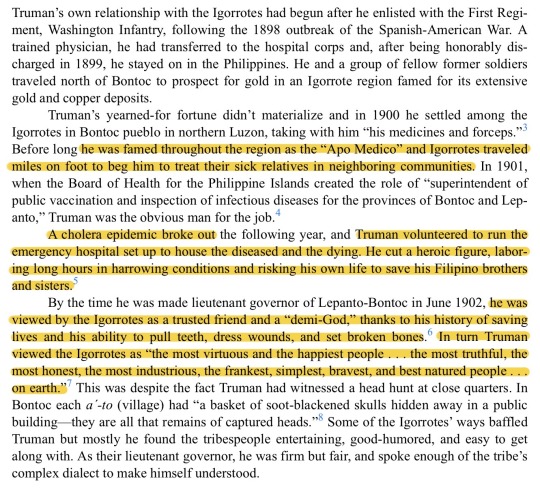
Section from Claire Prentice, The Lost Tribe of Coney Island: Headhunters, Luna Park, and the Man Who Pulled Off the Spectacle of the Century, New York, NY: Amazon Publishing, 2014.
While the cholera epidemic that occurred at the onset of the American Colonial Period was arguably the worst in the history of cholera epidemic management in the Philippines, I want to make it very, very clear that it was not the first and only wave that hit the archipelago. There had been a handful in the prior century alone — all of such magnitudes that it embedded a deep collective trauma; farmers refused to harvest their crops for fear of infection, tragically enabling famines and contributing starvation & nutrition deficiencies on top of a viral & swift killer (the experience of severe, rapid dehydration is such that one can fall dead within hours of infection).
Given such an imaginably harrowing experience (and it was an awfully painful topic to study as someone who got infected with and survived COVID-19 and has family working as frontliners), how could the natives turn away a stranger with such miraculous powers? Who knows how they comprehended it (e.g. a benevolent sign from heaven they must accept) because, unfortunately, we have yet to discuss preserved accounts on that matter, if any at all.
What is known, however, is that there were Igorots who were not just enamored by the "opportunity of a lifetime," but the selected lucky candidates clearly expressed their consent to participate:
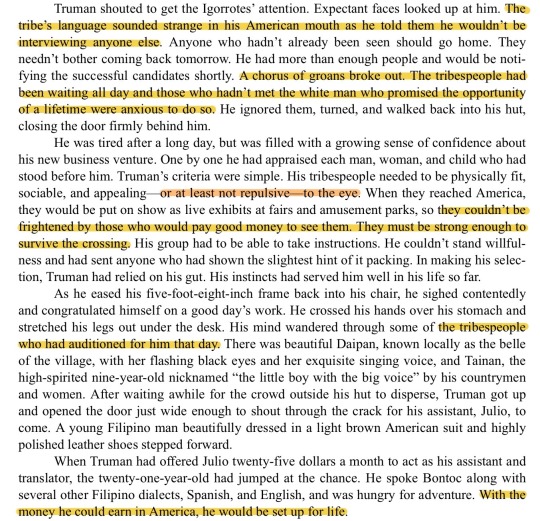
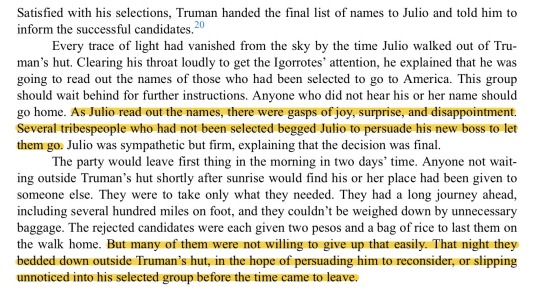
More sections from Prentice, The Lost Tribe of Coney Island.
I will quickly add that, unfortunately, a few members of the Igorot delegation died from illness in making the trip, and Hunt aged like milk over the years (fell into the trap of capitalism in pushing for more subsequent exhibit trips, to the point that less care was extended to the Igorots and he was ultimately arrested for embezzlement). Given that our scope remains to be the 1904 St. Louis Fair, any signs of abuse inflicted upon the Igorots during their stay based on preserved photographs is simply not clear. To assume that they were in a pitiable state would be to enforce a presentist reading that might betray not just their memories & experiences but also their right to self-determination.
EDIT (01/02/24): A good example to demonstrate what I mean in analyzing photographs, here's an article on the author's personal, genealogical research into the Igorots — specifically, the Suyoc — who were at the St. Louis Fair.
It truly is ironic that a Filipino is making these points as if to defend the United States as a whole (no I am not, and if you think I do, lumayas ka). I agree that white people gawking over the peoples of the Philippines with such fascination that borders fetishism warrants all the eye-rolls. At the same time — and it is even more ironic that I am pointing this out as a lowland, Christianized Tagalog based in the metro (not just any urbanized part of the country) — there is a character of patronizing these indigenous communities in the unspoken assumption that their participation is the fault of their ignorance. Pay attention, once more, to the demographics that constituted the Philippine exhibit in the 1904 St. Louis Fair — what kind of "Filipinos" were included and who were left out? There were also Negritos*, Visayans, and Muslims from Mindanao (historically referred to as Moros) in the same event, yet we hardly hear about their experiences. Perhaps it might have to do with how they were considered "more civilized" than these upland groups.
*OUTDATED term (and please blame the Spanish for it); these are the Aeta.
I understand Desa's reservations against US imperialism and sympathies for communities marginalized by Western colonization. I just hope that I was able to clarify as best as I could why I was so taken aback in how she depicted the Hetalia personification of my country the way she did. I agree that, as far as I ever got to interact with her, she is generally very polite and kind. That's why I gave her the benefit of the doubt when she approached me in DM to apologize for how her narrative choice was offensive. As someone who despised red tape in academia, I tried to talk to her about how there were valid reasons as to why the American Colonial Period was considered a mixed blessing, even by PH historians.
Instead, she pulled a complete 180.
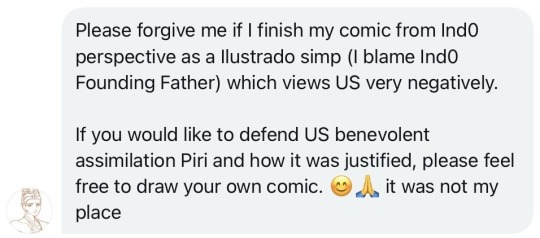
She said that — to a Filipino who condemned imperialism (no matter who started it), who also happened to study history as a profession, and was also a Hetalia fan who wants to explore Hetalia narratives differently from what was popularized. Half of the reason was because some fandom takes left a bad taste, like eating a dish with ingredients that even Gordon Ramsay would tell you shouldn’t go together; the other half was because I saw things differently and wanted to express it because why not?
I want to say it's not necessary to bring up something from a private conversation, but I will anyway to reiterate that my issue is not that she isn't nice. Bluntly, however, the way she said those words so formally did creep me out, but ultimately, my issue lies in how her biases have led her into making off-putting takes from time to time. I will not say more, but Trust Me? was not the only Twitter comic by Desa that got bombastic side-eyes.
And if only because Sukarno got dragged in, I felt compelled to briefly debunk that as well: even he initially viewed the United States in a very positive light: “The United States occupies a very distinguished part, a very distinguished place, in the hearts of the Indonesian people.” That was uttered in 1961, and it took a very specific historical context to instigate a complete shift by 1964:
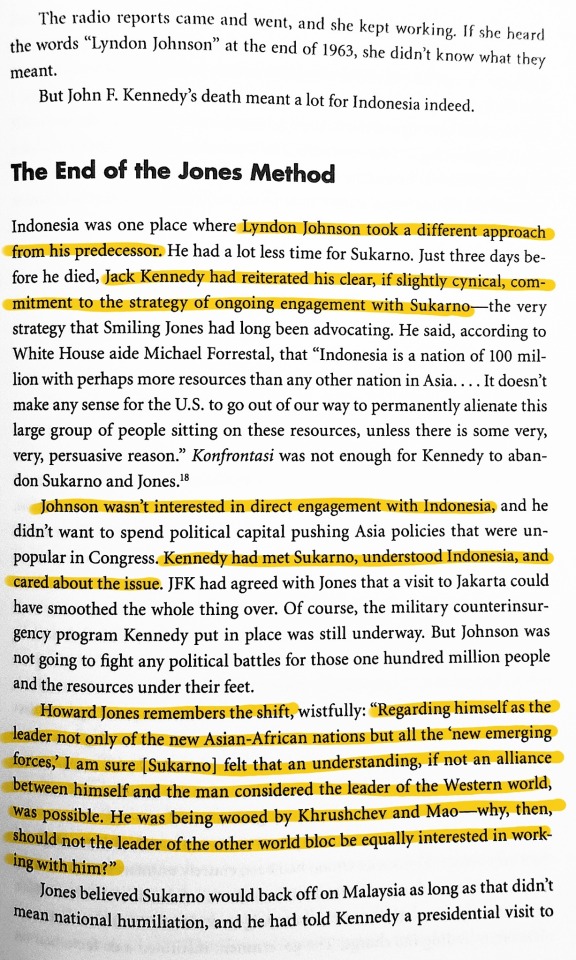
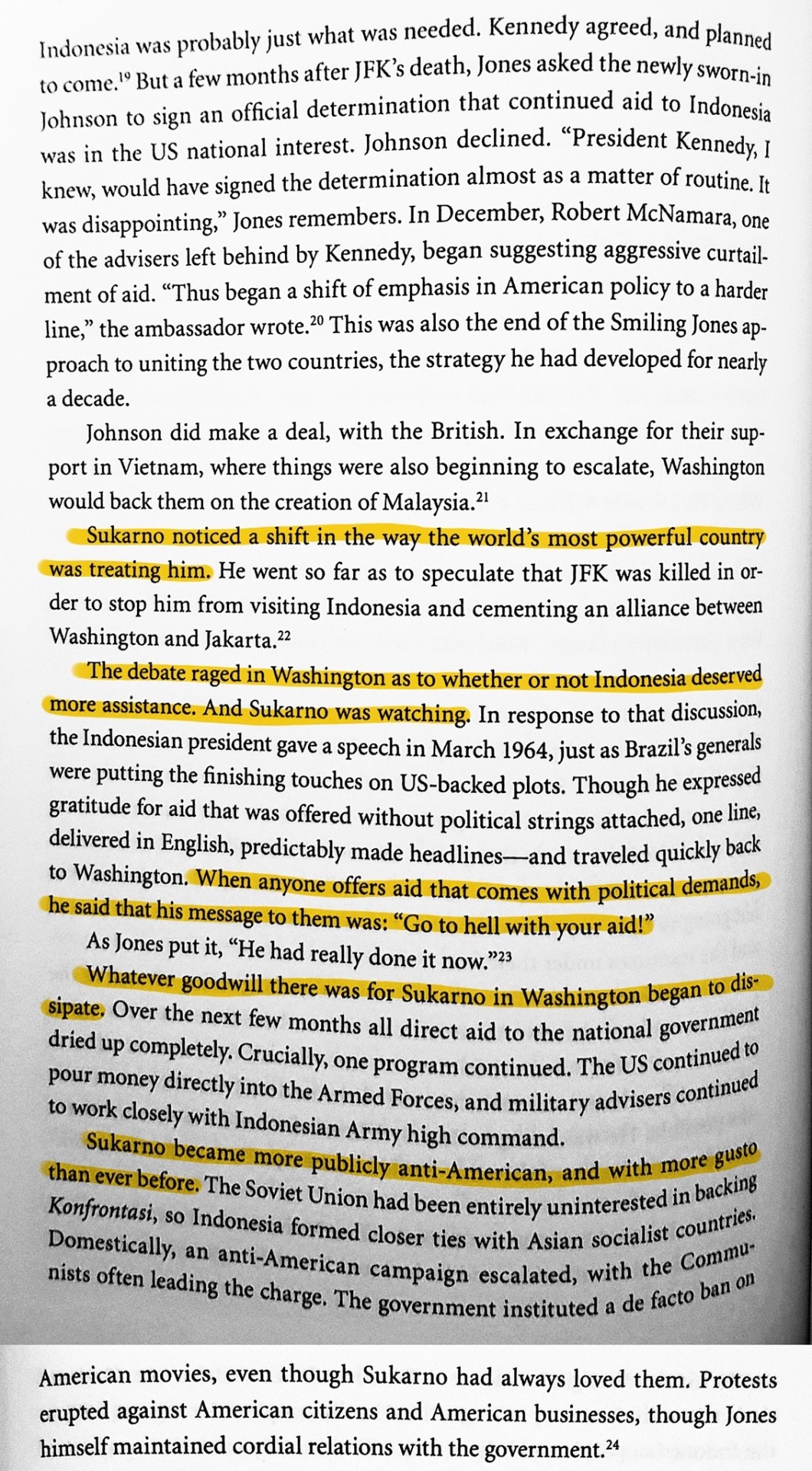
Sections from Vincent Bevins, The Jakarta Method: Washington’s Anticommunist Crusade & the Mass Murder Program that Shaped Our World, New York: PublicAffairs, 2021, 121-123.
EDIT (01/02/24): Note that Desa was citing Sukarno's later sentiments in the late 1960s as her reason for characterizing Indonesia as such in her comic. However, the setting of the story was the late 1920s (Indonesia's visit was based on Tan Malaka's abscondence to the Philippines). I'd dare say the anachronism was not due to oversight but a deliberate choice in using a certain fictional character — namely HWS Indonesia — as propaganda for Desa's anti-Americanism.
It's definitely depressing to think about all the "lost" history & culture that thrived before the arrival of white colonizers. It's why I'm surprised that, for a fiction work, she didn't project all that anger onto Spain instead — it had to specifically be the United States. Was it because they basically cockblocked Philippine independence, even though Spain practically sold the Philippines to the US? The implication that Spain should be permitted to wash its hands clean of all accountability was an awkward message to convey.
I understand that nothing could be 100% accurate (I'm actually quoting Desa defending herself on that matter) in fiction, but the level of projection coming from a certain non-Filipino reading Philippine history was so silly. And again, how did it all justify the explicit depiction of HWS Philippines as an indigenous man in a human zoo? (END OF EDIT)
As my professors will also never tire of saying: you can disagree with a historian’s interpretations but you can never disagree with the evidence in themselves. You don’t have to morally agree either, and I can guarantee you that many Filipinos do not. I, myself, resented the endgame of the particular war that brought that period about in the first place. How dare, then, she said it was “not her place” to defend US imperialism, while granting herself the freedom to express her country’s feelings on the matter?
Oh, it’s all just fiction? I do not condone the subsequent treatment she received, but why then couldn’t she stop trying to “educate” NLID shippers? I do not know how both sides talked to one another, only that what caught me eye was: Why does everyone else have to respect her fiction while she gets to disrespect others’ fictions for not aligning with hers?
EDIT (01/20/24): Just to clarify further on that point — over a decade ago, she went ham in the comment section of someone's (APH) America x (fem!OC) Indonesia. That ship is not in my lore either simply because I follow a totally different route. To cut to the chase, she took that fanart very personally and infodumped on US war crimes that involved Indonesia.
I know Tan Malaka started the whole North Indonesia agenda, but come on, neither was it Desa's place to just treat HWS Philippines the way she did. An Indonesian schooling other Indonesians on ID history is not surprising, but an Indonesian schooling a Filipino on PH history? I'd be humbled if they had the credentials. She didn't and, unless she enrolled herself in a graduate program, she still doesn't.
By all technicalities, she can’t ship IDPH because the Philippine government was (unfortunately and grossly) complicit in the chain of events that led to the 1965-66 genocides in Indonesia. Yet, she does despite of that fact. We thus circle back to Trust Me? and how that was a manifestation of her stubborn refusal to acknowledge any nuances by projecting HWS Indonesia as a self-proclaimed savior of HWS Philippines from the beguile of US neocolonialism.
I empathize with her anger. I'm sorry that the US government by extent enabled what her family went through. I agree that it's not her place to defend them; in fact, she shouldn't. But when even the so-called "highest of Malay nations*" is worth her neutrality, how can she expect me to forgive her?
*That is literally what the Philippines is to her; I know this because she explicitly said so to me in DM. DO NOT ASK FOR RECEIPTS, I am not comfortable revealing that particular conversation.
I cannot — in fact, NO ONE SHOULD — afford to be neutral about Duterte or Marcos, etc., and for her to be so flippant about her privilege (by way of ethnicity/citizenship/cultural upbringing) to be neutral** about Philippine politics, while simultaneously NAGGING ON EVERYBODY TO RESPECT INDONESIAN POLITICS, is annoying at best and plain selfish at worst.
**Also explicitly said to me in DM. Again, DO NOT ASK FOR RECEIPTS.
(END OF EDIT)
I’m not Indonesian but I do not have it in me to politely accuse a native Indonesian of allowing their personal biases to misread their own history. As a Filipino, however, while I'm not surprised by the reductionist chronicling of the histories & cultures of the Philippines, I am at a loss for words over the continuing idolization for Desa & Maaf, when she was not the best and most reliable narrator, especially given her negligence in representing indigenous peoples through her comics.
I mean, guys, I'm not saying this as if the Trust Me? comic was the first and only instance when this was literally Maaf canon that sat comfortably in the internet for over a decade, and continues to be appraised as THE BIBLE OF HISTORICAL HETALIA.
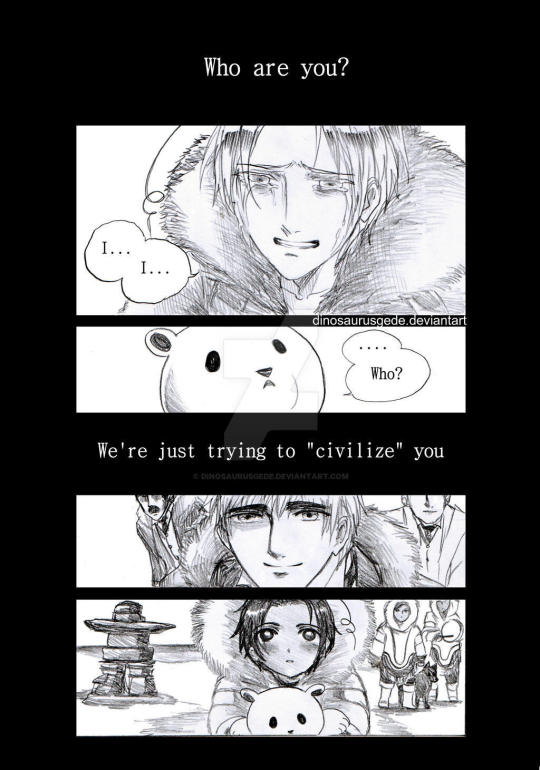
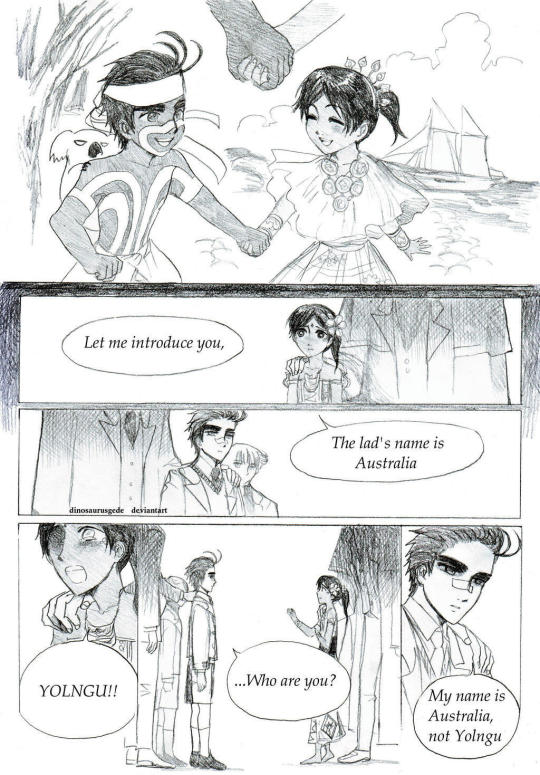
EDIT (01/20/24 — originally added via a reblog): I cannot believe this needs to be said because this is the consequence of when Hetalia fans take their fiction too literally because creators have made careless takes.
There were SEAtalians joking about how the Yolngu are a dead people.
I repeat.
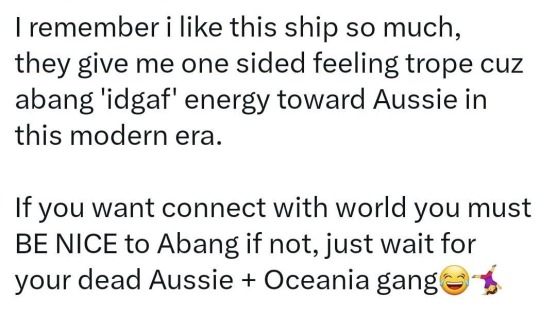
THERE WERE SEATALIANS JOKING ABOUT HOW THE YOLNGU ARE A DEAD PEOPLE.
(END OF EDIT)
So as 2023 comes to a close we enter 2024, I'd like to conclude this post with the following points:
At best, Wikipedia is a satisfactory jumping point, but please believe me when I say no historian will respect you for (over-)relying on Wikipedia. And given that anyone with a decent device & internet signal can access Wikipedia, Desa is just not a GOAT in historical research.
At worst, idolizing Maaf patronizes the work of historians. It doesn't help that PH historians have been targets of harassment because of dis-/misinformation campaigns. I bring this up because it's already bad enough to have to confront that reality outside of fandom spaces on a regular basis in standing our ground for more just historical truths. I hope that folks understand why that's a particularly sensitive struggle for me, and why receiving such comments like the one I shared above deeply hurt. She was not apologetic about that — and every time she would post about apologizing for the moments she has offended others, or when others compliment her for being so open-minded, I cannot help but feel bitter.
Other BIPOC — yes, not just other SEAsians and that's on literally drawing nations other than SEA — have spoken up on the matter. If you can talk about how you learned so much from Desa, you can also learn as much from other perspectives. I hope that in raising all of this, more SEAtalians understand that we risk othering non-SEA BIPOC.
The idolization of Maaf (and the creator in question) is personally far more off-putting than the problematic points of Maaf or any comic she has ever made, because I think she caved to peer pressure instead of learning to wield her fiction more sensitively without being too reliant of the opinions of those she has pleased. Not even Hidekaz Himaruya writes his nationverse characters like that — the one time I’ll admit that canon trumps fanon.
I’m not stopping people from liking Maaf or Desa anyway. I just cannot help but take issue with how the SEAtalia fandom feels less of a safe & inclusive community than it is a cult centered on one person — almost as if her fiction is unquestionable canon and anyone who disagrees gets the boot. Once again, I do not condone the subsequent treatment she received in retaliation, but frankly that's just not what I'm addressing here.
I'm also not saying it's wrong to give words of reassurance and validation to people you admire, only that some of you need to understand you're forcing a parasocial relationship with your idols. It may feel good to you, but please be mindful of the unwarranted pressure it imposes.
I apologize for dumping all of this at literally the end of the year. I want to let it all go in a manner that is clear, concise, and not overwhelming to digest. I do hope that my candid thoughts will push the fandom one step forward in critically consuming media without having to resort to crab-mentality tendencies — because it's been especially hard seeing the demeaning takes made about the Philippines in this fandom.
#hetalia#historical hetalia#hetalia critical#racism cw#hws philippines#aph philippines#hws indonesia#aph indonesia#hws america#aph america#mentions of death cw#sibuyas
44 notes
·
View notes
Text
Is it ok to say I don't like Bridgerton
#idk the marital rape plotpoint in the book and the show turned me off from the entire story#and then the “british empire/british royal family ended racism and colonialism”??#i just can't fuck with that even as fiction#honestly im just “over” fluffy British empire historical fiction#not hetalia#anti bridgerton#thoughts since new promo photos are out I can't get away from them
24 notes
·
View notes
Text
As an Asian person, seeing people describe Asian male characters when comparing them to white male characters as "Womanly" in 2023 almost 2024 makes me sick :)
#hetalia#disk horse#Dappy's twaddles#the fucking normalization of anti-asian racism in this fandom is astounding
19 notes
·
View notes
Text
saw a piece of fanart and thought it was silas. it wasn't. it was poland from hetalia. we are in the bad place.
#for starters i didnt think there were still hetalia fans in 2024#and second. remember when they made poland a cunty gay man. i mean it was for racism reasons but also. slay.
8 notes
·
View notes
Text
forbidden number 20
HOT TAKE TOURNAMENT
HETALIA PRELIMINARY (#20)
cw: Hetalia, and everything that entails
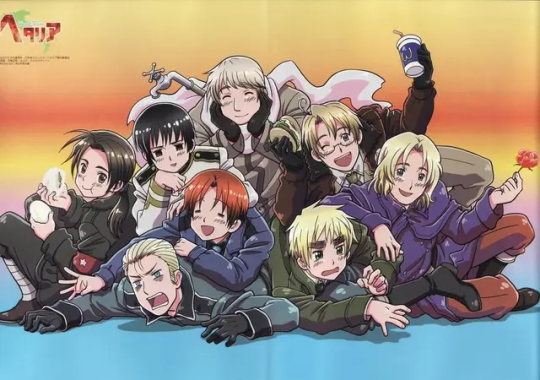
Submission 27 vs Submission 97
1. Honestly, the Hetalia fandom was super fucking fun.
2. Hetalia isn’t as bad as everyone makes it out to be
SUBMITTED JUSTIFICATION BELOW
[Submission 27]
1. Honestly, the Hetalia fandom was super fucking fun.
Like yeah, it was a horrifically shitty anime, with shitty ideals and values. But for a kid who isn't aware of that shit yet, and looks at the fandom as a means of creativity and expression? It was fun as hell. Despite everything, I still look upon those days very fondly! There was such a wealth of creativity and joy in that fandom. It's one of those things that feels deeply wrong to engage with once you have the brain to understand concepts like nationalism, and stereotypes, and bigotry, but it's very easy to get sucked into when you DON'T have all of that. I think that's why successors like CountryHumans keep popping up.
[Submission 97]
2. Hetalia isn’t as bad as everyone makes it out to be
While the fandom in the 2010s absolutely sucked, the show itself isn’t actually that bad. The earlier seasons have a lot of jokes made in poor taste and all around it’s not the best, the later seasons are pretty entertaining! There’s some fun history facts, comedy (that’s not anywhere near as bad as the earlier seasons), and the fandom has improved as well! The common misconception is that it’s purely about ww2, but it’s not. It’s an interesting concept on learning history, it’s not executed in the best possible way of course, but regardless, it has an interesting concept! The countries represent the people of the nation and NOT the governments, which I’ve noticed is also a common misconception.
Pre-preliminaries will be used to determine what qualifies as a hot take. Propaganda is encouraged!
Also, remember to reblog your favourite polls for exposure! (actually, maybe not this one)
#cw hetalia#hetalia#cw antisemitism#antisemitism#cw nationalism#cw racism#nationalism#racism#hot take tournament#tournament poll#tumblr poll#tumblr tournament#tumblr bracket#hot take#unpopular opinion#pre preliminary#preliminary poll#forbidden number 20
19 notes
·
View notes
Text
i think Lovino n Feliciano have a similar dynamic to Dee and Dennis
#minus the racism#god i have so many unfinished aniamtics i thought id release them#hetalia#hws veneziano#hws romano#hws italy#999art#lovino hitting feli where it hurts: his looks#hws north italy#hws south italy
129 notes
·
View notes
Text
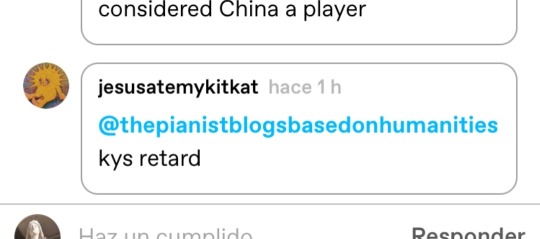

Rusame fans try not to send death threats and be Sinophobic because like (1) Chinese person questioned the popularity of your fucking wildly popular white boy ship challenge
Yeah everyone block this person and don't engage with them please (don't resort to their level and send threats/death threats) because what the fuck is this. Why do rusame fans act like they're a protected group lmfao bye sending death threats and helping spread covid conspiracies that literally get Chinese people thrown in front of trains because your anime jerk off material isn't popular with everyone.
#hetalia#hetalia world stars#hetalia world series#hetalia world twinkle#Hetalia racism#hetalia discourse
90 notes
·
View notes
Text
rant below cut
it’s starting to become really agitating seeing the amount of racism in this fandom and especially now it’s coming from people outside of tumblr i do not understand why people won’t just mind their business. (i have no idea how many more times i have to make this same post i’m begging people to stop dismissing peoples identities because it doesn’t align with your view points)
#disk horse#hetalia racism#i really hate that people have to drag in#stupid unrelated discourse#into discussions about racism#can we not have an ounce of nuance here#im just really tired i wanted a break from another fandom full of ppl starting stupid shit#and i come back to racially charged discourse#okay that’s enough complaining for the week
13 notes
·
View notes
Note
I want to say Francis was done the most dirty by the fandom but he was also just Like That. Very interesting character with multiple sides to explore don't get me wrong but Hima definitely made some choices with him lol.
He is a dirty pervert whose understanding of consent seems to be limited when it comes to other nations. It's still there in modern strips, I think. Like the stuff he says about Arthur in the Brexit comics is... unnerving. But he's been given enough material the past ten years to pull him up and out of the shit tiers.
I still think the most misunderstood character is China, though. Both in canon and by fanon. Ignored or misrepresented or the fetishism... He gets the least attention of the main eight, and even his centric stories are just sort of... blergh. I mean, I do enjoy the smug old man routine, and I thought the exploring the world and the giraffe, etc. strip was cute, but there aren't many strips that come to mind. I just think he's severely lacking in depth compared to the other main characters. And that Hima's fault, but fandom who are willing to go above and beyond for other secondary characters... But tbh I pin more fault on Hima. I don't even know if you call him a main character at this point, actually.
#people arguing Ivan I'm like perhaps you are right but at the same time 🥰ha ha Ivan is pathetic🥰#the layers of racism with yao though i think trumps it all#this is me throwing bricks in glass greenhouses mind you#i know i dont write him well but he is my favourite asian hetalia character 😭#q&a
7 notes
·
View notes
Text
Apparently not a well-known fact: Sh*na is a Japanese slur for Chinese people (and apparently Ryukuans) and is largely known to be offensive in Japan and China. It has a long history but since it became largely derogatory and hateful during the Imperial Japan era, it's now associated with colonization and racial supremacy. Likewise, the name of the knock-off hello kitty China likes (in canon) is a 'cutesy' version of this offensive racial slur. Please try to avoid it.
18 notes
·
View notes
Note
Thank you for stepping up for us. It's really sad to see people ignore POCs in this fandom and I'm sick of it.
They love to pretend that hetalia fandom got better when in reality it didn't.
I don't really usually look what goes on in the fandom besides the Baltic (and bit of Nordic, mostly NB8) part of it, so I have no idea how the treatment of POC characters and creators are.
(Only reason I discovered this situation is because my friend was upset over it and because the artist would make art with the Baltics. Oddly enough, I had a bad gut feeling about them in the past - seems like I was right.)
I do want to have faith, things I've heard happening long ago in the past and not hearing it happening so much now does give hope that things have improved. But clearly there is still a long way to go.
I hope this doesn't come off wrongly but I didn't see my addition to the post as really stepping up for anyone much - more like just adding to what needs to be said, but very minimally, as I just wanted to mention a bit of something no one had yet. I am a bit too mentally tired right now to start going too deep into it, but I'll support anyone who does.
I do hope things improve. Unfortunately we have to accept that not everyone's mind can be changed, so we just gotta spread awareness of this person's behaviour to kinda isolate them out of the fandom.
#hetalia#fandom discourse#?#is it appropriate to tag that?#idk#tw racism#i genuinely am lost on what to tag all this
8 notes
·
View notes
Text
why do all these bitches like south park. what is going on. i feel like im losing my mind. stop it youre scaring me.
#referring to not only the hs requiem group but also some recent followers#why do you like Bigotry The Show like i am so scared#HETALIA TOO. RACISM THE SHOW. STOP
13 notes
·
View notes